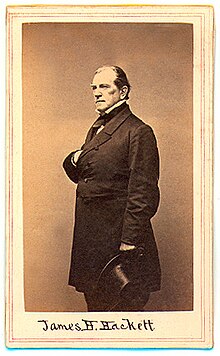James Henry Hackett
James Henry Hackett | |
|---|---|
 | |
| Born | March 15, 1800 |
| Died | December 28, 1871 |
| Occupation | Stage actor |
| Spouse | Catherine Leebuff |
| Children | James Keteltas Hackett |
James Henry Hackett (March 15, 1800[1] – December 28, 1871) was an American actor.[2][3]

Hackett was born in New York City. He entered Columbia College in 1815 but withdrew. He then studied law privately. In 1818, he became a wholesale clerk in a grocery firm in New York. In 1819, he married Catherine Leebuff, a young actress. After an unsuccessful entry into business, he went on the stage in March 1826 playing the role of Justice Woodcock in Love of a Village. He played opposite his wife in the play. He soon established a reputation as a player of eccentric character parts. The next year, he played at the Covent Garden in London with success. He traveled back and forth between the United States and Britain, achieving a reputation in the works of Shakespeare, particularly Falstaff. In 1834 he commissioned a play from writer John Neal to suit his strength with eccentric characters but rejected the comedy upon receipt.[4]
As a manager and impresario, he is remembered, among other things, for having engaged the troupe of Italian opera singers who formed the nucleus of the first season (1854–55) of the Academy of Music in New York City. After that, he appeared only rarely on the public stage. He was the author of Notes and Comments on Shakespeare (1863).
He was the father of Recorder John K. Hackett and actor James Keteltas Hackett.
Hackett died on December 28, 1871, in Jamaica, Long Island, New York.
Notes and references
- ^ Actors and Actresses of Great Britain and the United States: Kean and Booth edited by Brander Matthews, Laurence Hutton 1886.
- ^ Obituary article in the New York Times, December 29, 1871.
- ^ This article incorporates text from a publication now in the public domain: Chisholm, Hugh, ed. (1911). "Hackett, James Henry". Encyclopædia Britannica. Vol. 12 (11th ed.). Cambridge University Press. p. 794.
- ^ Lease, Benjamin (1972). That Wild Fellow John Neal and the American Literary Revolution. Chicago, Illinois: University of Chicago Press. pp. 185–188. ISBN 0-226-46969-7.
